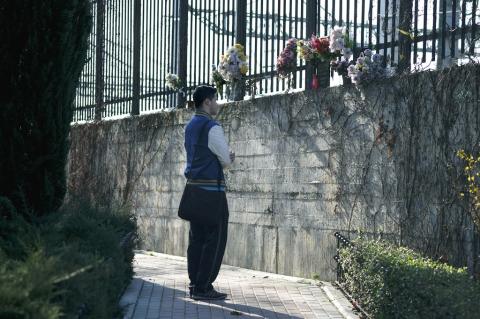Dressed in mourning black, Spaniards yesterday commemorated their country’s deadliest peace-time attack, a decade to the day since al-Qaeda-inspired bombers blew up four packed commuter trains and killed 191 people.
Relatives of people killed on the trains, which were carrying rush hour passengers from Madrid’s suburbs when they exploded on March 11, 2004, filled the pews in the city’s Almudena Cathedral for a solemn memorial mass.
A single bouquet of red and yellow flowers lay before the altar as 1,000 mourners took their seats, including relatives in black and members of the emergency services in their green and yellow uniforms.

Photo: AFP
Spanish King Juan Carlos and Prime Minister Mariano Rajoy joined in the solemn ceremony, leading the mourning by a nation still wary of violent Islamist radicals and “lone wolves” lured to their cause.
Juan Carlos, leaning on a walking stick after recent hip surgery, and his wife, Queen Sofia, embraced leaders of victims’ associations at the door of the cathedral before entering to doleful organ music and incense smoke.
The archbishop of Madrid, Antonio Maria Rouco Varela, leading the mass, remembered the victims in a homily.
“They died and suffered, and we suffer, because there were some who with blood-curdling premeditation were willing to kill innocent people,” he said.
After the attacks, however, “love triumphed over hate and life over death,,” as Spain rallied round to help the victims, he added.
A series of shrapnel-filled bombs detonated around 7:40am on March 11, 2004, in packed trains headed to Madrid’s main Atocha station, massacring 191 people, wounding about 2,000 and leaving many mentally scarred to this day.
Antonio Gomez, a 48-year-old bank computer specialist, was in a train at Atocha when bombs detonated, leaving him with a broken left leg.
“There were mutilated people, people thrown on the ground, people in a very bad state. I was one of the better off,” he said.
These days Gomez switches the channel when he sees television reports of the attack.
“On the 11th I will probably go to the cinema or watch the Disney Channel,” he said.
Spanish courts eventually sentenced 18 people for the bomb attacks. The seven chief suspects committed suicide weeks after the attack, by blowing themselves up in an apartment near Madrid, also killing a policeman.
On the eve of the 10th anniversary, Spanish Interior Minister Jorge Fernandez Diaz said al-Qaeda members refer often in their statements to “Al Andalus,” in reference to Spain.
“Clearly Spain forms part of the strategic objectives of global jihad. We are not the only ones, but we are in their sights,” he said.
The Madrid train bombing changed the immediate course of Spanish politics.
Then-prime minister Jose Maria Aznar’s conservative government immediately blamed the armed Basque separatist group ETA.
However, al-Qaeda soon claimed responsibility, saying the attacks were punishment for Spain’s role, under Aznar, in the US-led invasion of Iraq.
In a general election three days after the bombings, voters punished Aznar, handing an unforeseen victory to Socialist Jose Luis Rodriguez Zapatero.
Since the day of the bombings, 472 suspected Islamic extremists have been arrested in Spain, Fernandez Diaz said.
The Spanish counterterrorist service’s alert level is at its second-highest category, signifying “a likely risk of attack”, he said.

Kehinde Sanni spends his days smoothing out dents and repainting scratched bumpers in a modest autobody shop in Lagos. He has never left Nigeria, yet he speaks glowingly of Burkina Faso military leader Ibrahim Traore. “Nigeria needs someone like Ibrahim Traore of Burkina Faso. He is doing well for his country,” Sanni said. His admiration is shaped by a steady stream of viral videos, memes and social media posts — many misleading or outright false — portraying Traore as a fearless reformer who defied Western powers and reclaimed his country’s dignity. The Burkinabe strongman swept into power following a coup in September 2022

‘FRAGMENTING’: British politics have for a long time been dominated by the Labor Party and the Tories, but polls suggest that Reform now poses a significant challenge Hard-right upstarts Reform UK snatched a parliamentary seat from British Prime Minister Keir Starmer’s Labor Party yesterday in local elections that dealt a blow to the UK’s two establishment parties. Reform, led by anti-immigrant firebrand Nigel Farage, won the by-election in Runcorn and Helsby in northwest England by just six votes, as it picked up gains in other localities, including one mayoralty. The group’s strong showing continues momentum it built up at last year’s general election and appears to confirm a trend that the UK is entering an era of multi-party politics. “For the movement, for the party it’s a very, very big

A new online voting system aimed at boosting turnout among the Philippines’ millions of overseas workers ahead of Monday’s mid-term elections has been marked by confusion and fears of disenfranchisement. Thousands of overseas Filipino workers have already cast their ballots in the race dominated by a bitter feud between President Ferdinand Marcos Jr and his impeached vice president, Sara Duterte. While official turnout figures are not yet publicly available, data from the Philippine Commission on Elections (COMELEC) showed that at least 134,000 of the 1.22 million registered overseas voters have signed up for the new online system, which opened on April 13. However,

ENTERTAINMENT: Rio officials have a history of organizing massive concerts on Copacabana Beach, with Madonna’s show drawing about 1.6 million fans last year Lady Gaga on Saturday night gave a free concert in front of 2 million fans who poured onto Copacabana Beach in Rio de Janeiro for the biggest show of her career. “Tonight, we’re making history... Thank you for making history with me,” Lady Gaga told a screaming crowd. The Mother Monster, as she is known, started the show at about 10:10pm local time with her 2011 song Bloody Mary. Cries of joy rose from the tightly packed fans who sang and danced shoulder-to-shoulder on the vast stretch of sand. Concert organizers said 2.1 million people attended the show. Lady Gaga